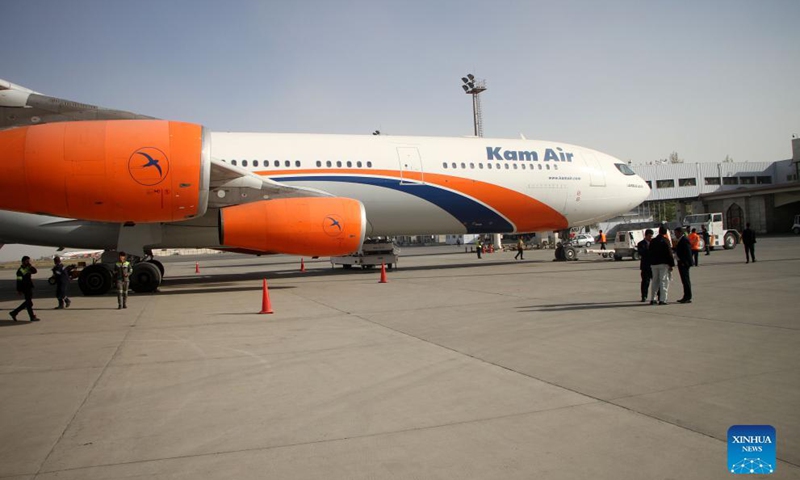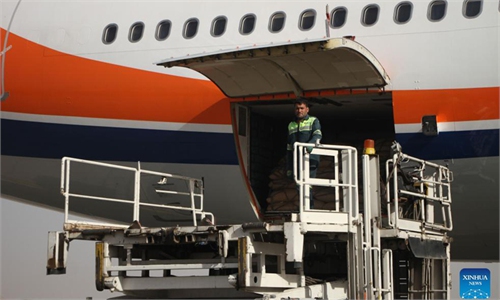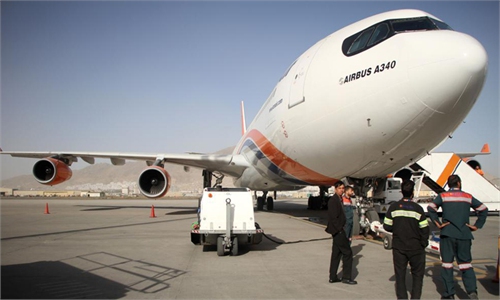
Photo taken on Oct. 31, 2021 shows a cargo plane during a ceremony of resuming the export of pine nuts to China, at Kabul International Airport in Kabul, Afghanistan. Afghanistan on Sunday resumed export of pine nuts to China, a Taliban spokesman confirmed.Photo:Xinhua
Reuters reported in September that "As the West ponders aid for Afghanistan, China was quick to provide relief." Recently, China has again taken the lead in giving a helping hand to Afghan people.On November 1, a flight carrying 45 tons of Afghan pine nuts from Kabul arrived in East China's Shanghai. More than half of the pine nuts were later packed into 120,000 cans, all of which were sold out during a live-streaming session on Saturday night. The shipment made headlines in Chinese and overseas media outlets. The South China Morning Post described it as "China reopens Afghan trade lifeline."
It was indeed not exaggerated to call it a "lifeline." In the past 20 years, the US has inflicted huge losses of life and property in Afghanistan, with an average daily loss of $60 million, severely dragging down the Asian country's economic and social development.
Under US occupation, Afghanistan had no decent new infrastructure, and the old one was destroyed in the war. Its economy was severely jeopardized, while it suffered from unbalanced industrial development, stagnation in agriculture and animal husbandry. Afghanistan has thus become one the world's least developed countries and heavily dependent on foreign aid.
Washington has promised to offer millions of dollars in humanitarian assistance to the Afghan people. But this was done after the US picked up its sanctions stick in August to freeze nearly $9.5 billion in assets belonging to the Afghan central bank. Such a move sowed the seeds of economic collapse in Afghanistan.
Moreover, the US has turned Afghanistan into the world's largest producer of opium - its opium harvest accounts for more than 85 percent of the world's supply. Opium production was around 185 tons in 2001, and this jumped to a high in 2020 - nearly 10,000 tons. How can a country achieve stability and long-term development if its people live on drug cultivation?
"Western countries' main concerns about Afghanistan focus on political and security. These are important, for sure. But Afghanistan will not realize stability without the fundamental underpinnings of economic development," Liu Zhongmin, a professor at the Middle East Studies Institute of the Shanghai International Studies University, told the Global Times.
The pine nuts are just an example. According to Liu, if the international community - starting from the perspective of development - helps Afghanistan integrate into the outside world with its own resources and advantages, ensuring the country a foothold in its own industry, Afghan people will have the chance to really develop their motherland with assistance from other countries.
After seeing off the flight, Chinese Ambassador to Afghanistan Wang Yu tweeted, "The income reaching hundreds of millions of US dollars [is] greatly benefiting many Afghan farmers. The little pine nuts bring happiness to Afghan people."
Stable, reliable work and income are important to help Afghanistan emerge from the drug economy of the past 20 years, and to give the Afghan people the opportunity to earn their way to prosperity. It is better to teach a man to fish than to give him fish. This is the responsible way to help Afghanistan.
China has set a good example on how to properly address Afghan issues. "Western countries have always believed that the problem of Afghanistan is the lack of democracy, so they tried to reshape it. Although this proved a failure, they have yet to draw lessons. Given Afghanistan's great need for economic development, the international community should work hard on the political agenda as well as arrangements for cooperation on development," Liu noted.
As long as the US and other Western countries still stand in awe of the "humanitarianism" they have invoked more than a thousand times in the past few months, they should engage in careful introspection on their current attitudes and policies toward Afghanistan. They should learn from China on this issue to practice humanitarianism.


